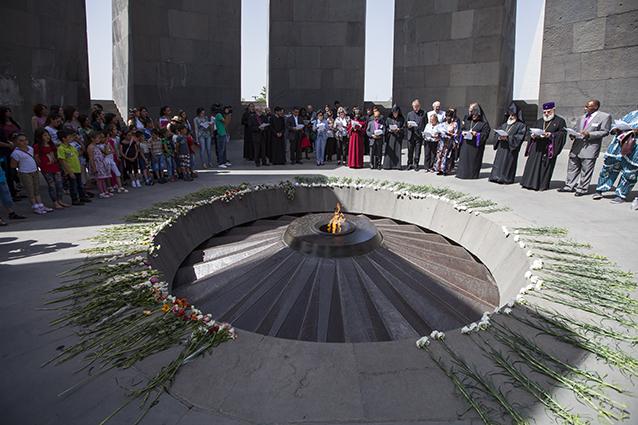By Theodore Gill, WCC senior editor
“The member churches of the World Council of Churches have pledged themselves to stand against all genocides, wherever they happen,” said the Rev. Dr Olav Fykse Tveit, general secretary of the council (WCC), on the morning of 10 June after a solemn service of remembrance at the Armenian Genocide Memorial and Museum overlooking the capital city of Yerevan. The service took place in the context of the 100th anniversary of an era of great suffering following mass arrests, executions and deportation of Armenians beginning on 24 April 1915.
Speaking before a cluster of cameras, microphones and more than 40 journalists on the terrace between the open-air chapel of the eternal flame and the museum’s entrance, Tveit explained the churches’ hope that “this year will provide a declaration of the truth” concerning the horrors of a century ago “and lead to reconciliation, which will be good for the Armenian people and for all.”
Partly in recognition of centenary observances world-wide throughout 2015, the WCC Executive Committee accepted the invitation of the Armenian Apostolic Church and its patriarch, Catholicos Karekin II, to hold their first of two meetings this year near Yerevan at the church centre in the Mother See of Holy Etchmiadzin. Their session lasts from 8 to 13 June.
The Armenian Genocide has been a source of international controversy. Approximately 1.5 million ethnic Armenians, almost all of them Christian, perished along with many of their communities and church buildings between 1915 and 1923. Many diplomats, journalists, scholars and missionaries of the era condemned this as the result of deliberate policies of extermination during the period of the First World War, the collapse of the Ottoman Empire and the rise of the modern Turkish state. Others, including successive governments of Turkey, have denied that the tragedy was a result of planning but arose incidentally from the chaotic circumstances of the time.
In 1948, the United Nations Convention on the Prevention and Punishment of the Crime of Genocide would define “genocide” in international law as “crimes committed with the intent to destroy, in whole or in part, a national, ethnical, racial or religious group”. Armenian leaders have consistently asked that their national disaster be recognized formally as genocide.
The World Council of Churches began speaking of the Armenian genocide in the 1970s, and it was officially recognized by the council’s 6th Assembly at Vancouver, Canada in 1983.
In the general secretary’s opening remarks to the executive committee this year, Tveit argued, “These centennial commemorations should mark that we have passed the time when governments continue to be reluctant in naming what happened as genocide. Such discussion keeps wounds opened that should by now, for the benefit of all parties, be healed and reconciled through the acknowledgment of the truth. The world, and particularly this part of the world, needs new initiatives that bring a just peace to people who are suffering today in neighbouring countries.”
At the memorial chapel, the service of commemoration centred on the well of the eternal flame. In addition to the 20-member executive committee, WCC officers and supporting staff, more than 300 participants joined in common prayer. Many brought long-stemmed flowers, laying them respectfully around the circular well.
Members of the executive committee led prayers and scripture readings, among them two committee members from the Armenian Apostolic Church, Archbishop Vicken Aykazian of the Mother See of Holy Etchmiadzin and Bishop Nareg Alemezian of the Catholicosate of Cilicia in Antelias, Lebanon.
In addition to recollection of the Armenian martyrs, prayers were offered for “other Christian martyrs who died during the Greek and Assyrian genocides, as there is not a designated Day of Remembrance for them”, as well as all who suffer today in such neighbouring, war-torn lands as Iraq and Syria. Prayer was offered, too, for the safe return of two Orthodox bishops of Aleppo in Syria who were kidnapped in April 2013, and that the persecution of Christians in the Middle East “will not succeed in the eliminating of the Christian presence from the place where Christianity was born.”
Bishop Hovakim Manukyan shared a meditation and prayer by Catholicos Karekin II. In the closing prayer, he said: “Martyrdom does not recognize the difference of denominations. The martyrs unite us as children and servants of our one Lord Jesus Christ, to gather together and implement unified efforts for the sake of the establishment of love, justice and peace in the world, and the promotion of dialogue between civilizations and religions.”
At the close of morning prayer, WCC moderator Dr Agnes Abuom read the statement of the executive committee on the Armenian Genocide that had been adopted the day before.
The executive committee visited the Armenian Genocide Museum before returning to Etchmiadzin. The modern facility mounts a multi-media exhibition illustrating the events surrounding 1915 and offers extensive evidence of crimes against humanity.
Before leaving the museum, the group was led in prayer by executive committee member Bishop Chibuzo Raphael Opoko of the Methodist Church in Nigeria. He said that during the visit, he found himself “filled with tears” as he recalled atrocities he had experienced during the civil turmoil in eastern Nigeria during the 1960s. The photos, films and narrative in the museum brought back the terror of that time, and of so many times in so many nations.
Opoko recalled the words of Isaiah 60:2, “For behold, darkness shall cover the earth, and thick darkness the peoples; but the Lord will arise upon you, and God’s glory will be upon you.”
“Thank God for the pictures, thank God for the stories,” the bishop prayed. “Without the pictures, without the stories, the world would have never known.”
WCC Executive Committee gathers in Armenia to map the ecumenical pilgrimage (WCC press release of 9 June 2015)







